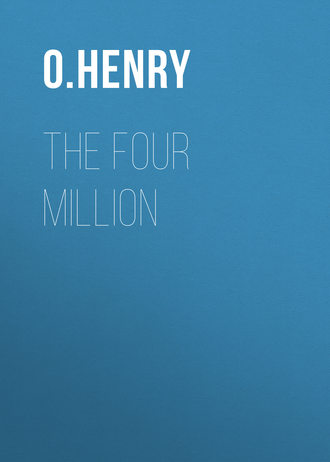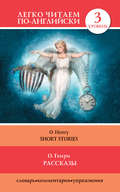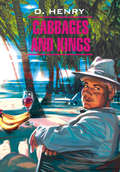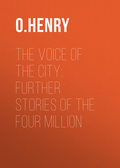
О. Генри
The Four Million
MEMOIRS OF A YELLOW DOG
I don't suppose it will knock any of you people off your perch to read a contribution from an animal. Mr. Kipling and a good many others have demonstrated the fact that animals can express themselves in remunerative English, and no magazine goes to press nowadays without an animal story in it, except the old-style monthlies that are still running pictures of Bryan and the Mont Pélee horror.
But you needn't look for any stuck-up literature in my piece, such as Bearoo, the bear, and Snakoo, the snake, and Tammanoo, the tiger, talk in the jungle books. A yellow dog that's spent most of his life in a cheap New York flat, sleeping in a corner on an old sateen underskirt (the one she spilled port wine on at the Lady Longshoremen's banquet), mustn't be expected to perform any tricks with the art of speech.
I was born a yellow pup; date, locality, pedigree and weight unknown. The first thing I can recollect, an old woman had me in a basket at Broadway and Twenty-third trying to sell me to a fat lady. Old Mother Hubbard was boosting me to beat the band as a genuine Pomeranian-Hambletonian-Red-Irish-Cochin-China-Stoke-Pogis fox terrier. The fat lady chased a V around among the samples of gros grain flannelette in her shopping bag till she cornered it, and gave up. From that moment I was a pet – a mamma's own wootsey squidlums. Say, gentle reader, did you ever have a 200-pound woman breathing a flavour of Camembert cheese and Peau d'Espagne pick you up and wallop her nose all over you, remarking all the time in an Emma Eames tone of voice: "Oh, oo's um oodlum, doodlum, woodlum, toodlum, bitsy-witsy skoodlums?"
From a pedigreed yellow pup I grew up to be an anonymous yellow cur looking like a cross between an Angora cat and a box of lemons. But my mistress never tumbled. She thought that the two primeval pups that Noah chased into the ark were but a collateral branch of my ancestors. It took two policemen to keep her from entering me at the Madison Square Garden for the Siberian bloodhound prize.
I'll tell you about that flat. The house was the ordinary thing in New York, paved with Parian marble in the entrance hall and cobblestones above the first floor. Our fiat was three – well, not flights – climbs up. My mistress rented it unfurnished, and put in the regular things – 1903 antique unholstered parlour set, oil chromo of geishas in a Harlem tea house, rubber plant and husband.
By Sirius! there was a biped I felt sorry for. He was a little man with sandy hair and whiskers a good deal like mine. Henpecked? – well, toucans and flamingoes and pelicans all had their bills in him. He wiped the dishes and listened to my mistress tell about the cheap, ragged things the lady with the squirrel-skin coat on the second floor hung out on her line to dry. And every evening while she was getting supper she made him take me out on the end of a string for a walk.
If men knew how women pass the time when they are alone they'd never marry. Laura Lean Jibbey, peanut brittle, a little almond cream on the neck muscles, dishes unwashed, half an hour's talk with the iceman, reading a package of old letters, a couple of pickles and two bottles of malt extract, one hour peeking through a hole in the window shade into the flat across the air-shaft – that's about all there is to it. Twenty minutes before time for him to come home from work she straightens up the house, fixes her rat so it won't show, and gets out a lot of sewing for a ten-minute bluff.
I led a dog's life in that flat. 'Most all day I lay there in my corner watching that fat woman kill time. I slept sometimes and had pipe dreams about being out chasing cats into basements and growling at old ladies with black mittens, as a dog was intended to do. Then she would pounce upon me with a lot of that drivelling poodle palaver and kiss me on the nose – but what could I do? A dog can't chew cloves.
I began to feel sorry for Hubby, dog my cats if I didn't. We looked so much alike that people noticed it when we went out; so we shook the streets that Morgan's cab drives down, and took to climbing the piles of last December's snow on the streets where cheap people live.
One evening when we were thus promenading, and I was trying to look like a prize St. Bernard, and the old man was trying to look like he wouldn't have murdered the first organ-grinder he heard play Mendelssohn's wedding-march, I looked up at him and said, in my way:
"What are you looking so sour about, you oakum trimmed lobster? She don't kiss you. You don't have to sit on her lap and listen to talk that would make the book of a musical comedy sound like the maxims of Epictetus. You ought to be thankful you're not a dog. Brace up, Benedick, and bid the blues begone."
The matrimonial mishap looked down at me with almost canine intelligence in his face.
"Why, doggie," says he, "good doggie. You almost look like you could speak. What is it, doggie – Cats?"
Cats! Could speak!
But, of course, he couldn't understand. Humans were denied the speech of animals. The only common ground of communication upon which dogs and men can get together is in fiction.
In the flat across the hall from us lived a lady with a black-and-tan terrier. Her husband strung it and took it out every evening, but he always came home cheerful and whistling. One day I touched noses with the black-and-tan in the hall, and I struck him for an elucidation.
"See, here, Wiggle-and-Skip," I says, "you know that it ain't the nature of a real man to play dry nurse to a dog in public. I never saw one leashed to a bow-wow yet that didn't look like he'd like to lick every other man that looked at him. But your boss comes in every day as perky and set up as an amateur prestidigitator doing the egg trick. How does he do it? Don't tell me he likes it."
"Him?" says the black-and-tan. "Why, he uses Nature's Own Remedy. He gets spifflicated. At first when we go out he's as shy as the man on the steamer who would rather play pedro when they make 'em all jackpots. By the time we've been in eight saloons he don't care whether the thing on the end of his line is a dog or a catfish. I've lost two inches of my tail trying to sidestep those swinging doors."
The pointer I got from that terrier – vaudeville please copy – set me to thinking.
One evening about 6 o'clock my mistress ordered him to get busy and do the ozone act for Lovey. I have concealed it until now, but that is what she called me. The black-and-tan was called "Tweetness." I consider that I have the bulge on him as far as you could chase a rabbit. Still "Lovey" is something of a nomenclatural tin can on the tail of one's self respect.
At a quiet place on a safe street I tightened the line of my custodian in front of an attractive, refined saloon. I made a dead-ahead scramble for the doors, whining like a dog in the press despatches that lets the family know that little Alice is bogged while gathering lilies in the brook.
"Why, darn my eyes," says the old man, with a grin; "darn my eyes if the saffron-coloured son of a seltzer lemonade ain't asking me in to take a drink. Lemme see – how long's it been since I saved shoe leather by keeping one foot on the foot-rest? I believe I'll – "
I knew I had him. Hot Scotches he took, sitting at a table. For an hour he kept the Campbells coming. I sat by his side rapping for the waiter with my tail, and eating free lunch such as mamma in her flat never equalled with her homemade truck bought at a delicatessen store eight minutes before papa comes home.
When the products of Scotland were all exhausted except the rye bread the old man unwound me from the table leg and played me outside like a fisherman plays a salmon. Out there he took off my collar and threw it into the street.
"Poor doggie," says he; "good doggie. She shan't kiss you any more. 'S a darned shame. Good doggie, go away and get run over by a street car and be happy."
I refused to leave. I leaped and frisked around the old man's legs happy as a pug on a rug.
"You old flea-headed woodchuck-chaser," I said to him – "you moon-baying, rabbit-pointing, egg-stealing old beagle, can't you see that I don't want to leave you? Can't you see that we're both Pups in the Wood and the missis is the cruel uncle after you with the dish towel and me with the flea liniment and a pink bow to tie on my tail. Why not cut that all out and be pards forever more?"
Maybe you'll say he didn't understand – maybe he didn't. But he kind of got a grip on the Hot Scotches, and stood still for a minute, thinking.
"Doggie," says he, finally, "we don't live more than a dozen lives on this earth, and very few of us live to be more than 300. If I ever see that flat any more I'm a flat, and if you do you're flatter; and that's no flattery. I'm offering 60 to 1 that Westward Ho wins out by the length of a dachshund."
There was no string, but I frolicked along with my master to the Twenty-third street ferry. And the cats on the route saw reason to give thanks that prehensile claws had been given them.
On the Jersey side my master said to a stranger who stood eating a currant bun:
"Me and my doggie, we are bound for the Rocky Mountains."
But what pleased me most was when my old man pulled both of my ears until I howled, and said: "You common, monkey-headed, rat-tailed, sulphur-coloured son of a door mat, do you know what I'm going to call you?"
I thought of "Lovey," and I whined dolefully.
"I'm going to call you 'Pete,'" says my master; and if I'd had five tails I couldn't have done enough wagging to do justice to the occasion.
THE LOVE-PHILTRE OF IKEY SCHOENSTEIN
The Blue Light Drug Store is downtown, between the Bowery and First Avenue, where the distance between the two streets is the shortest. The Blue Light does not consider that pharmacy is a thing of bric-a-brac, scent and ice-cream soda. If you ask it for pain-killer it will not give you a bonbon.
The Blue Light scorns the labour-saving arts of modern pharmacy. It macerates its opium and percolates its own laudanum and paregoric. To this day pills are made behind its tall prescription desk – pills rolled out on its own pill-tile, divided with a spatula, rolled with the finger and thumb, dusted with calcined magnesia and delivered in little round pasteboard pill-boxes. The store is on a corner about which coveys of ragged-plumed, hilarious children play and become candidates for the cough drops and soothing syrups that wait for them inside.
Ikey Schoenstein was the night clerk of the Blue Light and the friend of his customers. Thus it is on the East Side, where the heart of pharmacy is not glacé. There, as it should be, the druggist is a counsellor, a confessor, an adviser, an able and willing missionary and mentor whose learning is respected, whose occult wisdom is venerated and whose medicine is often poured, untasted, into the gutter. Therefore Ikey's corniform, be-spectacled nose and narrow, knowledge-bowed figure was well known in the vicinity of the Blue Light, and his advice and notice were much desired.
Ikey roomed and breakfasted at Mrs. Riddle's two squares away. Mrs. Riddle had a daughter named Rosy. The circumlocution has been in vain – you must have guessed it – Ikey adored Rosy. She tinctured all his thoughts; she was the compound extract of all that was chemically pure and officinal – the dispensatory contained nothing equal to her. But Ikey was timid, and his hopes remained insoluble in the menstruum of his backwardness and fears. Behind his counter he was a superior being, calmly conscious of special knowledge and worth; outside he was a weak-kneed, purblind, motorman-cursed rambler, with ill-fitting clothes stained with chemicals and smelling of socotrine aloes and valerianate of ammonia.
The fly in Ikey's ointment (thrice welcome, pat trope!) was Chunk McGowan.
Mr. McGowan was also striving to catch the bright smiles tossed about by Rosy. But he was no outfielder as Ikey was; he picked them off the bat. At the same time he was Ikey's friend and customer, and often dropped in at the Blue Light Drug Store to have a bruise painted with iodine or get a cut rubber-plastered after a pleasant evening spent along the Bowery.
One afternoon McGowan drifted in in his silent, easy way, and sat, comely, smooth-faced, hard, indomitable, good-natured, upon a stool.
"Ikey," said he, when his friend had fetched his mortar and sat opposite, grinding gum benzoin to a powder, "get busy with your ear. It's drugs for me if you've got the line I need."
Ikey scanned the countenance of Mr. McGowan for the usual evidences of conflict, but found none.
"Take your coat off," he ordered. "I guess already that you have been stuck in the ribs with a knife. I have many times told you those Dagoes would do you up."
Mr. McGowan smiled. "Not them," he said. "Not any Dagoes. But you've located the diagnosis all right enough – it's under my coat, near the ribs. Say! Ikey – Rosy and me are goin' to run away and get married to-night."
Ikey's left forefinger was doubled over the edge of the mortar, holding it steady. He gave it a wild rap with the pestle, but felt it not. Meanwhile Mr. McGowan's smile faded to a look of perplexed gloom.
"That is," he continued, "if she keeps in the notion until the time comes. We've been layin' pipes for the getaway for two weeks. One day she says she will; the same evenin' she says nixy. We've agreed on to-night, and Rosy's stuck to the affirmative this time for two whole days. But it's five hours yet till the time, and I'm afraid she'll stand me up when it comes to the scratch."
"You said you wanted drugs," remarked Ikey.
Mr. McGowan looked ill at ease and harassed – a condition opposed to his usual line of demeanour. He made a patent-medicine almanac into a roll and fitted it with unprofitable carefulness about his finger.
"I wouldn't have this double handicap make a false start to-night for a million," he said. "I've got a little flat up in Harlem all ready, with chrysanthemums on the table and a kettle ready to boil. And I've engaged a pulpit pounder to be ready at his house for us at 9.30. It's got to come off. And if Rosy don't change her mind again!" – Mr. McGowan ceased, a prey to his doubts.
"I don't see then yet," said Ikey, shortly, "what makes it that you talk of drugs, or what I can be doing about it."
"Old man Riddle don't like me a little bit," went on the uneasy suitor, bent upon marshalling his arguments. "For a week he hasn't let Rosy step outside the door with me. If it wasn't for losin' a boarder they'd have bounced me long ago. I'm makin' $20 a week and she'll never regret flyin' the coop with Chunk McGowan."
"You will excuse me, Chunk," said Ikey. "I must make a prescription that is to be called for soon."
"Say," said McGowan, looking up suddenly, "say, Ikey, ain't there a drug of some kind – some kind of powders that'll make a girl like you better if you give 'em to her?"
Ikey's lip beneath his nose curled with the scorn of superior enlightenment; but before he could answer, McGowan continued:
"Tim Lacy told me he got some once from a croaker uptown and fed 'em to his girl in soda water. From the very first dose he was ace-high and everybody else looked like thirty cents to her. They was married in less than two weeks."
Strong and simple was Chunk McGowan. A better reader of men than Ikey was could have seen that his tough frame was strung upon fine wires. Like a good general who was about to invade the enemy's territory he was seeking to guard every point against possible failure.
"I thought," went on Chunk hopefully, "that if I had one of them powders to give Rosy when I see her at supper to-night it might brace her up and keep her from reneging on the proposition to skip. I guess she don't need a mule team to drag her away, but women are better at coaching than they are at running bases. If the stuff'll work just for a couple of hours it'll do the trick."
"When is this foolishness of running away to be happening?" asked Ikey.
"Nine o'clock," said Mr. McGowan. "Supper's at seven. At eight Rosy goes to bed with a headache. At nine old Parvenzano lets me through to his back yard, where there's a board off Riddle's fence, next door. I go under her window and help her down the fire-escape. We've got to make it early on the preacher's account. It's all dead easy if Rosy don't balk when the flag drops. Can you fix me one of them powders, Ikey?"
Ikey Schoenstein rubbed his nose slowly.
"Chunk," said he, "it is of drugs of that nature that pharmaceutists must have much carefulness. To you alone of my acquaintance would I intrust a powder like that. But for you I shall make it, and you shall see how it makes Rosy to think of you."
Ikey went behind the prescription desk. There he crushed to a powder two soluble tablets, each containing a quarter of a grain of morphia. To them he added a little sugar of milk to increase the bulk, and folded the mixture neatly in a white paper. Taken by an adult this powder would insure several hours of heavy slumber without danger to the sleeper. This he handed to Chunk McGowan, telling him to administer it in a liquid if possible, and received the hearty thanks of the backyard Lochinvar.
The subtlety of Ikey's action becomes apparent upon recital of his subsequent move. He sent a messenger for Mr. Riddle and disclosed the plans of Mr. McGowan for eloping with Rosy. Mr. Riddle was a stout man, brick-dusty of complexion and sudden in action.
"Much obliged," he said, briefly, to Ikey. "The lazy Irish loafer! My own room's just above Rosy's. I'll just go up there myself after supper and load the shot-gun and wait. If he comes in my back yard he'll go away in a ambulance instead of a bridal chaise."
With Rosy held in the clutches of Morpheus for a many-hours deep slumber, and the bloodthirsty parent waiting, armed and forewarned, Ikey felt that his rival was close, indeed, upon discomfiture.
All night in the Blue Light Drug Store he waited at his duties for chance news of the tragedy, but none came.
At eight o'clock in the morning the day clerk arrived and Ikey started hurriedly for Mrs. Riddle's to learn the outcome. And, lo! as he stepped out of the store who but Chunk McGowan sprang from a passing street car and grasped his hand – Chunk McGowan with a victor's smile and flushed with joy.
"Pulled it off," said Chunk with Elysium in his grin. "Rosy hit the fire-escape on time to a second, and we was under the wire at the Reverend's at 9.3O ¼. She's up at the flat – she cooked eggs this mornin' in a blue kimono – Lord! how lucky I am! You must pace up some day, Ikey, and feed with us. I've got a job down near the bridge, and that's where I'm heading for now."
"The – the – powder?" stammered Ikey.
"Oh, that stuff you gave me!" said Chunk, broadening his grin; "well, it was this way. I sat down at the supper table last night at Riddle's, and I looked at Rosy, and I says to myself, 'Chunk, if you get the girl get her on the square – don't try any hocus-pocus with a thoroughbred like her.' And I keeps the paper you give me in my pocket. And then my lamps fall on another party present, who, I says to myself, is failin' in a proper affection toward his comin' son-in-law, so I watches my chance and dumps that powder in old man Riddle's coffee – see?"
MAMMON AND THE ARCHER
Old Anthony Rockwall, retired manufacturer and proprietor of Rockwall's Eureka Soap, looked out the library window of his Fifth Avenue mansion and grinned. His neighbour to the right – the aristocratic clubman, G. Van Schuylight Suffolk-Jones – came out to his waiting motor-car, wrinkling a contumelious nostril, as usual, at the Italian renaissance sculpture of the soap palace's front elevation.
"Stuck-up old statuette of nothing doing!" commented the ex-Soap King. "The Eden Musee'll get that old frozen Nesselrode yet if he don't watch out. I'll have this house painted red, white, and blue next summer and see if that'll make his Dutch nose turn up any higher."
And then Anthony Rockwall, who never cared for bells, went to the door of his library and shouted "Mike!" in the same voice that had once chipped off pieces of the welkin on the Kansas prairies.
"Tell my son," said Anthony to the answering menial, "to come in here before he leaves the house."
When young Rockwall entered the library the old man laid aside his newspaper, looked at him with a kindly grimness on his big, smooth, ruddy countenance, rumpled his mop of white hair with one hand and rattled the keys in his pocket with the other.
"Richard," said Anthony Rockwall, "what do you pay for the soap that you use?"
Richard, only six months home from college, was startled a little. He had not yet taken the measure of this sire of his, who was as full of unexpectednesses as a girl at her first party.
"Six dollars a dozen, I think, dad."
"And your clothes?"
"I suppose about sixty dollars, as a rule."
"You're a gentleman," said Anthony, decidedly. "I've heard of these young bloods spending $24 a dozen for soap, and going over the hundred mark for clothes. You've got as much money to waste as any of 'em, and yet you stick to what's decent and moderate. Now I use the old Eureka – not only for sentiment, but it's the purest soap made. Whenever you pay more than 10 cents a cake for soap you buy bad perfumes and labels. But 50 cents is doing very well for a young man in your generation, position and condition. As I said, you're a gentleman. They say it takes three generations to make one. They're off. Money'll do it as slick as soap grease. It's made you one. By hokey! it's almost made one of me. I'm nearly as impolite and disagreeable and ill-mannered as these two old Knickerbocker gents on each side of me that can't sleep of nights because I bought in between 'em."
"There are some things that money can't accomplish," remarked young Rockwall, rather gloomily.
"Now, don't say that," said old Anthony, shocked. "I bet my money on money every time. I've been through the encyclopaedia down to Y looking for something you can't buy with it; and I expect to have to take up the appendix next week. I'm for money against the field. Tell me something money won't buy."
"For one thing," answered Richard, rankling a little, "it won't buy one into the exclusive circles of society."
"Oho! won't it?" thundered the champion of the root of evil. "You tell me where your exclusive circles would be if the first Astor hadn't had the money to pay for his steerage passage over?"
Richard sighed.
"And that's what I was coming to," said the old man, less boisterously. "That's why I asked you to come in. There's something going wrong with you, boy. I've been noticing it for two weeks. Out with it. I guess I could lay my hands on eleven millions within twenty-four hours, besides the real estate. If it's your liver, there's the Rambler down in the bay, coaled, and ready to steam down to the Bahamas in two days."
"Not a bad guess, dad; you haven't missed it far."
"Ah," said Anthony, keenly; "what's her name?"
Richard began to walk up and down the library floor. There was enough comradeship and sympathy in this crude old father of his to draw his confidence.
"Why don't you ask her?" demanded old Anthony. "She'll jump at you. You've got the money and the looks, and you're a decent boy. Your hands are clean. You've got no Eureka soap on 'em. You've been to college, but she'll overlook that."
"I haven't had a chance," said Richard.
"Make one," said Anthony. "Take her for a walk in the park, or a straw ride, or walk home with her from church. Chance! Pshaw!"
"You don't know the social mill, dad. She's part of the stream that turns it. Every hour and minute of her time is arranged for days in advance. I must have that girl, dad, or this town is a blackjack swamp forevermore. And I can't write it – I can't do that."
"Tut!" said the old man. "Do you mean to tell me that with all the money I've got you can't get an hour or two of a girl's time for yourself?"
"I've put it off too late. She's going to sail for Europe at noon day after to-morrow for a two years' stay. I'm to see her alone to-morrow evening for a few minutes. She's at Larchmont now at her aunt's. I can't go there. But I'm allowed to meet her with a cab at the Grand Central Station to-morrow evening at the 8.30 train. We drive down Broadway to Wallack's at a gallop, where her mother and a box party will be waiting for us in the lobby. Do you think she would listen to a declaration from me during that six or eight minutes under those circumstances? No. And what chance would I have in the theatre or afterward? None. No, dad, this is one tangle that your money can't unravel. We can't buy one minute of time with cash; if we could, rich people would live longer. There's no hope of getting a talk with Miss Lantry before she sails."
"All right, Richard, my boy," said old Anthony, cheerfully. "You may run along down to your club now. I'm glad it ain't your liver. But don't forget to burn a few punk sticks in the joss house to the great god Mazuma from time to time. You say money won't buy time? Well, of course, you can't order eternity wrapped up and delivered at your residence for a price, but I've seen Father Time get pretty bad stone bruises on his heels when he walked through the gold diggings."
That night came Aunt Ellen, gentle, sentimental, wrinkled, sighing, oppressed by wealth, in to Brother Anthony at his evening paper, and began discourse on the subject of lovers' woes.
"He told me all about it," said brother Anthony, yawning. "I told him my bank account was at his service. And then he began to knock money. Said money couldn't help. Said the rules of society couldn't be bucked for a yard by a team of ten-millionaires."
"Oh, Anthony," sighed Aunt Ellen, "I wish you would not think so much of money. Wealth is nothing where a true affection is concerned. Love is all-powerful. If he only had spoken earlier! She could not have refused our Richard. But now I fear it is too late. He will have no opportunity to address her. All your gold cannot bring happiness to your son."
At eight o'clock the next evening Aunt Ellen took a quaint old gold ring from a moth-eaten case and gave it to Richard.
"Wear it to-night, nephew," she begged. "Your mother gave it to me. Good luck in love she said it brought. She asked me to give it to you when you had found the one you loved."
Young Rockwall took the ring reverently and tried it on his smallest finger. It slipped as far as the second joint and stopped. He took it off and stuffed it into his vest pocket, after the manner of man. And then he 'phoned for his cab.
At the station he captured Miss Lantry out of the gadding mob at eight thirty-two.
"We mustn't keep mamma and the others waiting," said she.
"To Wallack's Theatre as fast as you can drive!" said Richard loyally.
They whirled up Forty-second to Broadway, and then down the white-starred lane that leads from the soft meadows of sunset to the rocky hills of morning.
At Thirty-fourth Street young Richard quickly thrust up the trap and ordered the cabman to stop.
"I've dropped a ring," he apologised, as he climbed out. "It was my mother's, and I'd hate to lose it. I won't detain you a minute – I saw where it fell."
In less than a minute he was back in the cab with the ring.
But within that minute a crosstown car had stopped directly in front of the cab. The cabman tried to pass to the left, but a heavy express wagon cut him off. He tried the right, and had to back away from a furniture van that had no business to be there. He tried to back out, but dropped his reins and swore dutifully. He was blockaded in a tangled mess of vehicles and horses.
One of those street blockades had occurred that sometimes tie up commerce and movement quite suddenly in the big city.
"Why don't you drive on?" said Miss Lantry, impatiently. "We'll be late."
Richard stood up in the cab and looked around. He saw a congested flood of wagons, trucks, cabs, vans and street cars filling the vast space where Broadway, Sixth Avenue and Thirty-fourth street cross one another as a twenty-six inch maiden fills her twenty-two inch girdle. And still from all the cross streets they were hurrying and rattling toward the converging point at full speed, and hurling themselves into the struggling mass, locking wheels and adding their drivers' imprecations to the clamour. The entire traffic of Manhattan seemed to have jammed itself around them. The oldest New Yorker among the thousands of spectators that lined the sidewalks had not witnessed a street blockade of the proportions of this one.
"I'm very sorry," said Richard, as he resumed his seat, "but it looks as if we are stuck. They won't get this jumble loosened up in an hour. It was my fault. If I hadn't dropped the ring we – "
"Let me see the ring," said Miss Lantry. "Now that it can't be helped, I don't care. I think theatres are stupid, anyway."
At 11 o'clock that night somebody tapped lightly on Anthony Rockwall's door.
"Come in," shouted Anthony, who was in a red dressing-gown, reading a book of piratical adventures.
Somebody was Aunt Ellen, looking like a grey-haired angel that had been left on earth by mistake.
"They're engaged, Anthony," she said, softly. "She has promised to marry our Richard. On their way to the theatre there was a street blockade, and it was two hours before their cab could get out of it.
"And oh, brother Anthony, don't ever boast of the power of money again. A little emblem of true love – a little ring that symbolised unending and unmercenary affection – was the cause of our Richard finding his happiness. He dropped it in the street, and got out to recover it. And before they could continue the blockade occurred. He spoke to his love and won her there while the cab was hemmed in. Money is dross compared with true love, Anthony."
"All right," said old Anthony. "I'm glad the boy has got what he wanted. I told him I wouldn't spare any expense in the matter if – "
"But, brother Anthony, what good could your money have done?"







